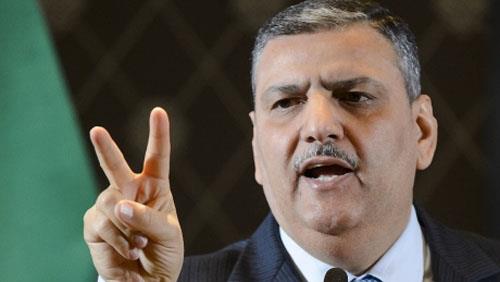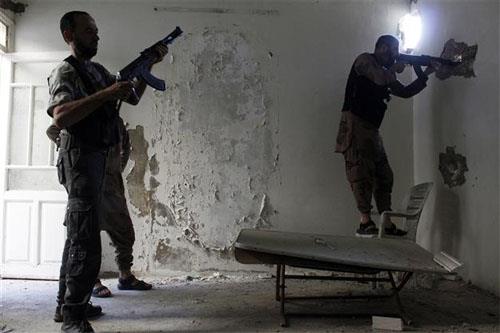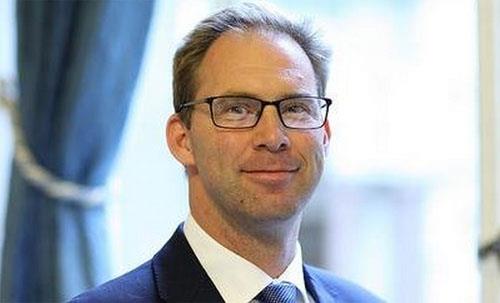New York, Asharq Al-Awsat, Sept. 20, 2016 – The Syrian opposition presented its roadmap for a transition to a democratic state, during an extensive meeting held on Monday in New York, under the patronage of Saudi Arabia and in the presence of representatives from Qatar, Turkey, the United Kingdom, Germany, France and the United States.

Children walk in a makeshift camp on March 12, 2016 at the Greek-Macedonian border, near the Greek village of Idomeni
The proposal was put forward by an umbrella group representing Syria’s different opposition factions. The roadmap is formed of three phases, starting with a negotiations phase, followed by the creation of an interim government, and leading to the establishment of a new political system in Syria.
Monday’s meeting was headed by Saudi Arabia’s permanent representative to the United Nations, Ambassador Abdullah Al-Muallimi, who stressed that Syrian head of regime Bashar al-Assad should not take part in Syria’s future.

Syrian President Bashar al-Assad must leave power after six months of negotiations on a transitional government, opposition negotiator Riyad Hijab says
The plan was presented by Riyad Hijab, the coordinator of the High Negotiations Committee (HNC) and former prime minister of Syria.
“The High Negotiations Committee has submitted its vision for the future of Syria through negotiations which pave the road for a transitional period that starts with the departure of head of Syrian regime Bashar Assad and his clique,” Hijab told international delegates in the meeting on the sidelines of the United Nations General Assembly.

Meeting on Syria’s political future begins in New York
The document, finalized in London at the beginning of September, outlines a three-phase process for government transition beginning with a permanent ceasefire, with the exception of ongoing anti-terrorism operations.
The proposal calls for a six-month negotiation between the opposition and the government based on the Geneva Agreement that was forged in 2012. During this period, both parties pledge to abide by a temporary ceasefire, lift the blockade to allow the access of the Syrian population to humanitarian aid and release war prisoners, in line with U.N. Security Council Resolution 2254.
The second phase starts with the formation of a transitional government and lasts for 18-month.

A FSA rebel stands on a chair to aim his weapon through a hole as others
The interim government will have full executive powers to write a new constitution. This phase should also see the departure of Assad and his close officials, according to the roadmap.
The third and final stage involves implementation of the constitution with local, legislative, and presidential elections, under the supervision of the United Nations.

The Minister of Foreign Affairs of Qatar Sheikh Mohammed bin Abdulrahman bin Jassim alThani
Qatar’s Foreign Affairs Minister Mohammed bin Jassem Al Thani expressed his country’s support to the new roadmap and lauded the optimistic approach adopted by the Syrian opposition. He also stressed the necessity for Assad to leave the Syrian political arena.
For his part, Hijab said that no political solution could be reached in Syria before Assad’s departure.
He also condemned Russia and Iran’s continuous support to Assad’s regime.
“The current regime in Syria has created terrorism just to tell the world that it is fighting terrorists,” Hijab said.
He also accused Russia of killing the Syrian population and called for immediate measures to save war-stricken civilians.
Hijab went on to say that terrorism can only be eradicated by toppling the current regime and putting an end to Iranian interference in Syria and other neighboring countries, including Iraq, Lebanon, Yemen and Bahrain.
He added that the international community should assume its responsibility to impose the implementation of international resolutions on Syria.
The representative of the Turkish foreign affairs ministry expressed his country’s full support to the Syrian opposition and stressed the need to lift the blockade and implement the ceasefire.

British Foreign Office Minister for Middle East and Africa Tobias Ellwood said the Syrian regime should be held accountable for its acts, while the U.S. envoy to Syria, Michael Ratney, said his country was seeking to put an end to violence and establish an appropriate environment to launch the political process.








